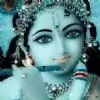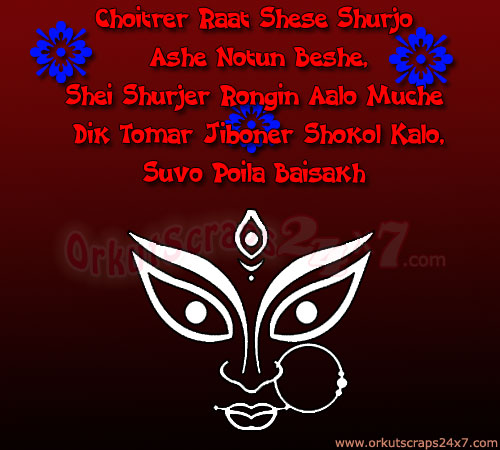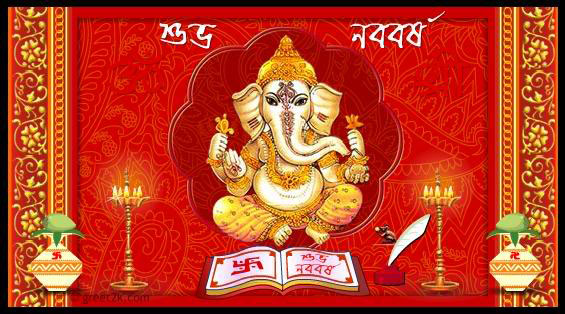Naba Barsha in Bengal.
Naba Barsha Traditions and Customs Joyful and culturally rich people of West Bengal celebrate Naba Barsha by dutifully performing set customs and traditions. To welcome the New Year, people clean and decorate their houses. A very important tradition of Naba Varsha is the making of elaborate rangolis or alpanas in front of the house by womenfolk. Rangolis are prepared with flour and its center is adorned with earthenware pot decorated with auspicious swastika. This pot is filled with holy water and mango leaves to symbolize a prosperous year for the family. On Naba Barsha, people of West Bengal propitiate Goddess Lakshmi - the Hindu mythological Goddess of Wealth to pray for prosperity and well being. Many devotees also take a dip in a nearby river to mark the occasion. For Bengalis, Naba Barsha is the beginning of all business activities. Businessmen and traders purchase new accounting books and start new account known as Haalkhata. People also worship Lord Ganesha by chanting mantras. Naba Barsha Celebrations Naba Barsha celebrations are marked with joy, enthusiasm and hope. Songs, dance, games besides reciting of poems are organized in various parts of the West Bengal to mark the occasion. Enthusiastic people of Bengal also celebrate the eve of Naba Varsha as Chaitra-Sankranti and bid farewell to the past year. Early in the morning of Naba Barsha, Bengalis take out processions known as Prabhat Pheries. To participate in Prabhat Pheris ladies clad themselves in traditional Bengali sari (white sari with red border) and flowers in hair while men wear dhoti kurta. The day is spent in feasting and participating in cultural activities. People also visit friends and dear ones to wish each other "Shubho Nabo Barsho !!" In Kolkata, Poila Boishakh (and the entire month of Boishakh) is considered to be an auspicious time for marriages. These days people wear new clothes and go about socialising. Choitro, the last month of the previous year, is the month of hectic activities and frantic purchases. Garment traders organise a Choitro sale and sell the garments with heavy discounts. Poila Boishakh is the day for cultural programmes. Prayers are offered for the well-being and prosperity of the family. Young women clad in white saris with red borders and men clad in dhuti and kurta take part in the Probhat Pheri processions early in the morning to welcome the first day of the year. This day being auspicious, new businesses and new ventures are started. The Mahurat is performed, marking the beginning of new ventures. Poila Boishakh is the beginning of all business activities in Bengal. The Bengali Hindu traders purchase new accounting book. The accounting in the halkhata begins only after offering puja. Mantras are chanted and shostik ("Hindu swastika") are drawn on the accounting book by the priests. Long queues of devotees are seen in front of the Kalighat temple from late night. Devotees offer puja to receive the blessings of the almighty. On Poila Boishakh fairs are held in West Bengal. The most famous of these is Bangla Sangit Mela, held at Nandan-Rabindra Sadan ground. It is conducted by the Government of West Bengal. |













































